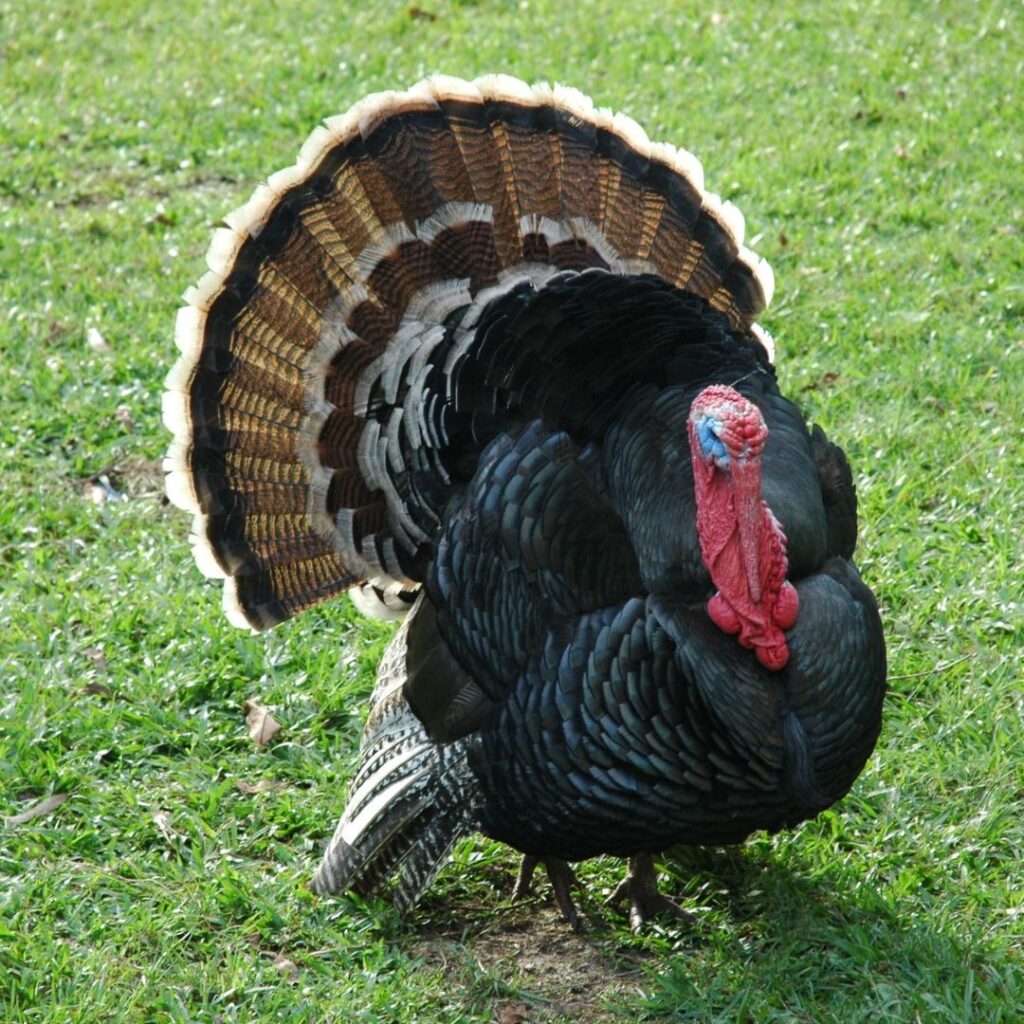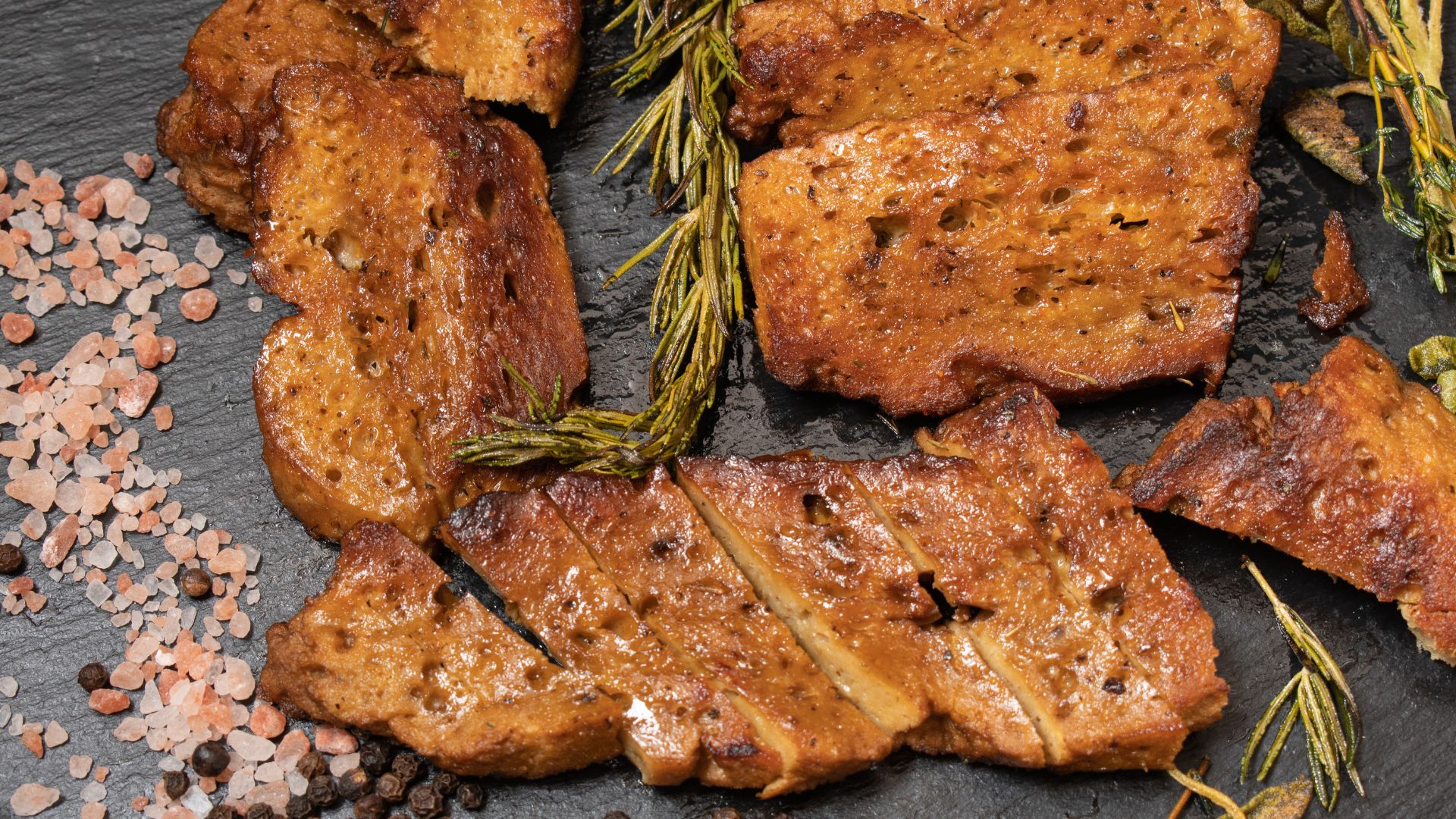How To Turn Thanksgiving Into ThanksLIVING In 2023

by: Jaena Moynihan
As the festive season approaches, millions of Americans eagerly anticipate the joyous gatherings and delectable feasts that come with Thanksgiving.
However, it’s also a good time to reflect on the impact our food choices have on the planet and its inhabitants.
In this article, we’ll delve into the ethical and environmental concerns surrounding traditional Thanksgiving meals.
We’ll also explore the staggering statistics of turkey production, and provide enticing alternatives that not only satisfy your taste buds but also align with a sustainable and cruelty-free ethos.
The Unseen Cost of Tradition
Thanksgiving has long been synonymous with the iconic turkey centerpiece, but behind this tradition lies a sobering reality.
Each year, approximately 46 million turkeys are slaughtered for Thanksgiving alone.
The industrialization of turkey farming has led to the genetic modification of these birds to the extent that they can no longer mate naturally.
This not only raises ethical concerns but also highlights the drastic measures taken to meet the demand for the Thanksgiving table.

The Sentience of Turkeys
Turkeys are not just commodities; they are sentient beings capable of feeling pain, expressing love, and exhibiting natural behaviors.
Unfortunately, the conditions in industrial farming operations prevent them from engaging in these behaviors.
Acknowledging the emotional intelligence of turkeys challenges the ethical foundation of consuming them as a tradition.
The Environmental Toll of Turkey Farming
The industrial-scale production of turkeys is associated with a myriad of ecological challenges that impact our planet.
Resource Intensity
Turkey farming requires vast amounts of resources, including land, water, and feed. The environmental footprint of producing a single turkey is substantial, contributing to deforestation and habitat loss as agricultural land expands.
Water Pollution
The runoff from turkey farms, laden with antibiotics, hormones, and excess nutrients, poses a significant threat to water ecosystems. This pollution can lead to the contamination of nearby water sources, affecting aquatic life and compromising the quality of drinking water.
While the Thanksgiving turkey has become a symbol of abundance and tradition, the environmental cost of turkey farming is one that often goes unnoticed.
Greenhouse Gas Emissions
The intensive farming practices associated with turkey production contribute to greenhouse gas emissions. Methane and nitrous oxide, potent greenhouse gasses, are released from manure management and feed production, exacerbating climate change.
Waste Management Challenges
The sheer volume of waste generated by turkey farms poses a considerable challenge. Inadequate waste management can result in the release of harmful substances into the environment, further compromising air and water quality.
By choosing plant-based alternatives for Thanksgiving, individuals can significantly reduce their carbon footprint and contribute to a more sustainable and eco-friendly food system.
The Impact of Turkey Meat on Human Health
Beyond its environmental implications, turkey meat also poses certain health concerns that are important to consider.
Antibiotic Resistance
The routine use of antibiotics in turkey farming to promote growth and prevent disease has raised concerns about antibiotic resistance. Consuming meat from animals treated with antibiotics may contribute to the development of antibiotic-resistant bacteria, posing a threat to human health.
Processed Meat Risks
Processed turkey products, such as deli slices and sausages, often contain additives, preservatives, and high levels of sodium. Regular consumption of processed meats has been linked to an increased risk of certain health conditions, including cardiovascular disease and certain types of cancer.
Saturated Fat Content
While turkey is often perceived as a lean meat, certain cuts and preparations can still contribute to a significant intake of saturated fats.
Excessive consumption of saturated fats is associated with an increased risk of heart disease and other cardiovascular issues.
Concerns about Hormones and Growth Promoters
The use of hormones and growth promoters in turkey farming has raised questions about the potential impact on human health.
While regulatory measures exist, some concerns persist about the residues of these substances in the meat we consume.
In making a conscious choice to adopt a plant-based Thanksgiving, individuals not only contribute to environmental sustainability but also take a positive step towards prioritizing their own health.
By exploring delicious and nutritious vegan alternatives, you can savor the flavors of the season without compromising well-being.
Plant-Powered Alternatives
The good news is that you can still enjoy a hearty and satisfying Thanksgiving feast without contributing to the suffering of animals.
The key is to embrace plant-based alternatives that capture the essence of traditional dishes. One notable solution is to explore the world of vegan roasts.
Egg and Dairy Replacements
To elevate your plant-based Thanksgiving experience, explore alternative ingredients that replace eggs and dairy in your favorite recipes.
Whether you’re baking desserts or preparing savory dishes, there are plenty of plant-based options available.
From flaxseed and applesauce as egg replacements to almond milk and coconut cream as dairy alternatives, the possibilities are vast.
Creating Flavorful Vegan Roasts
Seitan, a protein-rich meat substitute made from wheat gluten, is a versatile ingredient that can be crafted into delectable roasts.
These roasts not only mimic the taste and texture of traditional meat but also boast similar macronutrient profiles.
By making your own seitan roasts, you can take control of the ingredients and create a centerpiece that aligns with your values.
This plant-based alternative not only offers a delicious centerpiece for your Thanksgiving table but also comes with a host of benefits for the planet and your well-being.
Resource Efficiency
Crafting a seitan turkey-style roast requires significantly fewer resources compared to traditional turkey farming.
The production of seitan involves the use of wheat gluten, a protein-rich wheat product, which minimizes the ecological footprint associated with land use, water consumption, and feed production.
Reduced Greenhouse Gas Emissions:
Seitan production generates fewer greenhouse gas emissions compared to industrial turkey farming.
By choosing plant-based alternatives, you contribute to mitigating climate change and fostering a more sustainable food system.
Lower Impact on Water Resources:
The water footprint of seitan is considerably lower than that of turkey farming. With water scarcity becoming an increasingly pressing global issue, opting for plant-based alternatives helps conserve this precious resource.
Health Benefits:
Protein-Packed and Nutrient-Dense:
Seitan is a protein powerhouse, providing a robust alternative to traditional meat sources.
It boasts a similar protein content to turkey, making it an excellent choice for those looking to meet their protein needs without the associated health and environmental drawbacks.
Low in Saturated Fat:
Unlike certain cuts of turkey, seitan is naturally low in saturated fat. A diet low in saturated fat is linked to better heart health, making the seitan turkey-style roast a heart-friendly option for Thanksgiving.
Versatile and Customizable
Seitan’s versatility allows for a wide range of flavors and culinary possibilities. By experimenting with herbs, spices, and cooking methods, you can tailor your seitan roast to suit your taste preferences, creating a personalized and delicious holiday centerpiece.
No Antibiotics or Hormones
One of the health advantages of choosing seitan is the absence of antibiotics and hormones.
Traditional turkey farming often involves the use of these substances, raising concerns about their impact on human health. Opting for seitan eliminates these worries.
Equal Protein, Lesser Impact
By opting for a seitan turkey-style roast, you can enjoy a Thanksgiving feast that aligns with your values and promotes well-being.
The comparable protein content, coupled with the environmental and health benefits, makes seitan an ideal choice for those seeking a sustainable and delicious alternative.
This Thanksgiving, let your table be a celebration not only of tradition but also of conscious choices that contribute to a healthier planet and a thriving you.
Vkind’s Turkey-Style Holiday Roast
To kickstart your plant-powered Thanksgiving journey, try our Turkey-Style Holiday Roast recipe to learn how easy it is to create a delicious and impressive centerpiece for your Thanksgiving table, for a fraction of the cost.
This flavorful and visually stunning centerpiece is a testament to the delicious possibilities of plant-based cooking!

Join the Plant-Powered Movement
This Thanksgiving, consider taking a compassionate step towards a plant-powered lifestyle.
As you embark on this journey towards a more compassionate Thanksgiving, we invite you to stay connected with the Vkind community.
Sign up for our newsletter to receive weekly updates on plant-based news, recipes, and tips.
By joining us, you become part of a movement that values animal welfare, environmental sustainability, and healthy living.
Conclusion
Thanksgiving is a time for gratitude, reflection, and, most importantly, conscious choices.
By opting for a plant-powered feast, you not only contribute to a more compassionate world but also indulge in delicious alternatives that rival their traditional counterparts.
Let this Thanksgiving be a celebration of values, flavors, and a commitment to a kinder, more sustainable future.
SUBSCRIBE TO OUR NEWSLETTER
Vkind Vibes is our popular weekly newsletter where we share the latest news, tastiest recipes, and hottest trends impacting the VegEconomy. SUBSCRIBE NOW!
WANT MORE?
JOIN US AT VKX 2024! The Vkind Experience (VKX) 2024 invites plant-curious guests to embark on an immersive adventure featuring chef-curated gourmet food flights, signature drinks, captivating visuals, and mesmerizing performance art.JOIN THE VKIND COMMUNITY Download the Vkind app on the App Store or Google Play to create your social profile and start sharing reviews of vegan businesses, watch original content, and explore the plant-based world with your friends!
JOIN THE VEGECONOMY Are you a vegan brand owner or professional? Add your listing to our business search platform to get more eyes on your vegan enterprise.
TAKE THE VEGECONOMY PLEDGE Take the VegEconomy Pledge to show support for sustainable business practices and make a commitment to Spend Like You Give A Damn.
WATCH & LEARN Subscribe to our YouTube channel for our latest shows, live events, interviews, videos, news, secret giveaways & more!
STREAM “PEELED”, THE ALL-VEGAN COOKING COMPETITION SHOW Produced by Vkind Studios in a limited 3-part web series, Peeled is the award-winning all-vegan cooking competition show that’s on a search to find “America’s Hottest Vegan Chef”.
FOLLOW & SHARE Our content is always entertaining, educational, and inclusive. Follow us everywhere on social media!
SHARE VEGAN RECIPES Share your delicious vegan recipes with the Vkind Community on our app and website.
